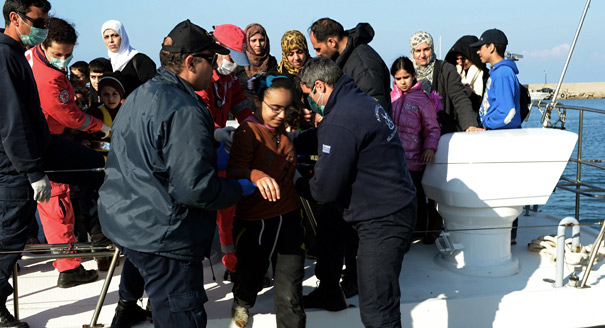In June, EU leaders will write a new five-year program for justice and home affairs. They plan a short, snappy vision focused on migration and asylum policy. Such intentions are welcome, not least in the EU’s East. There, governments are acutely worried about migration from East to West—their own nationals to Western Europe, Ukrainians to Central Europe. A little clarity in EU policy would go a long way.
But will leaders rise to the challenge? The signs are not good. Last month, the European Commission published its input. With the motivational title “An Open and Secure Europe: Making it Happen,” the document paves the way for a comprehensive strategy on fostering a shared commitment to a balance between long- and short-term priorities for, er, making it happen.
Of course, one can snigger at these technocratic clichés. But the commission’s draft, with its blithe statements about “competing for high-skilled migrants” and “combating the demographic decline,” is dangerously out of step with the mood both at home and abroad. The trouble is not so much the EU’s diagnosis of the challenges. It is its language of technocratic complacence.
In Europe, immigration has begun irritating even the professional classes. A global rise in education and wage levels means that newcomers are creating competition for native workers even in the elastic high-skilled labor market. Middle-class Europeans with progressive views about immigrant cleaners, babysitters, and manual workers are now feeling the pinch.
Meanwhile, abroad, the EU is being painted as moribund and effete. The commission may chirpily refer to “demographic decline” as a technocratic problem to be overcome by immigration. For the rest of the world, however, it is further proof that the EU is in a nosedive that can’t be reversed: the EU needs your kids because it’s not producing its own.
In short, the EU must get used to making migration policy in a multipolar age—where the bloc’s relative attractiveness and prosperity are in decline, other migration destinations are popping up, and European values no longer hold their old certainties and attraction.
But the most worrying feature of this new world is that EU-led discussions in the UN or the International Organization for Migration about “mobility” are slowly being eclipsed by a more static and zero-sum weltanschauung. It seems migration policy is being replaced by some kind of new politics of population. Two global developments explain this shift.
The first is the return of the state. A decade ago, in an age of Western supremacy, the EU was justified in treating migration as a postnational phenomenon—other states did not matter much, and nonstate actors were in fashion. But now, new powers are on the rise, and they are worried about their demographic health. Scared of tipping into the middle-income trap, they are showing a real preoccupation with the size and health of their populations.
The second development has been a worldwide shift of focus away from immigration and toward questions of emigration, brain drain, and immobility. This marks the declining influence of Western “receiving” countries and the growing power of “sending” countries. Those in the second group are nervous about the effects of mobility on their otherwise static populations. So-called “trapped populations” are now in the limelight—the immobile majority angrily left behind to deal with domestic problems.
The shift of political influence to less genteel parts of the world has spawned a brutal political environment. Experts warn that international institutions like the UN’s refugee agency could regress to their original function of controlling people flows for their biggest sponsors. Russian President Vladimir Putin’s land grabs are a sign of the times. Rather than passively opening its borders to a mobile population, Russia is moving its borders to encompass a static population.
So when the European Commission talks about competing for workers, it needs to know just how bruising that competition might be, and how far some countries may go to dissuade their brightest from leaving for Europe. And when it broaches the subject of integrating immigrants, the commission needs to recognize that this may now be deemed not so much progressive as aggressive.
Still, if EU leaders want to adapt to this new politics of population, they can take heart. The clue is in the name: this is about politics. At present, it is Western Europeans’ fixed ideas of immigration that are leading to the artificial polarization between “sending” and “receiving” countries, even as the real distinctions between them blur.
To make this mental shift, Western nations like Britain or France must start listening to the EU’s own sending countries—Poland or Romania or Bulgaria. These Eastern states echo global concerns about population. And they are tired of Western European countries harping on about “benefit tourism” or the burdens of immigration. The EU’s new home affairs program needs to be written in its East.
Roderick Parkes heads the EU Program at the Polish Institute of International Affairs.






